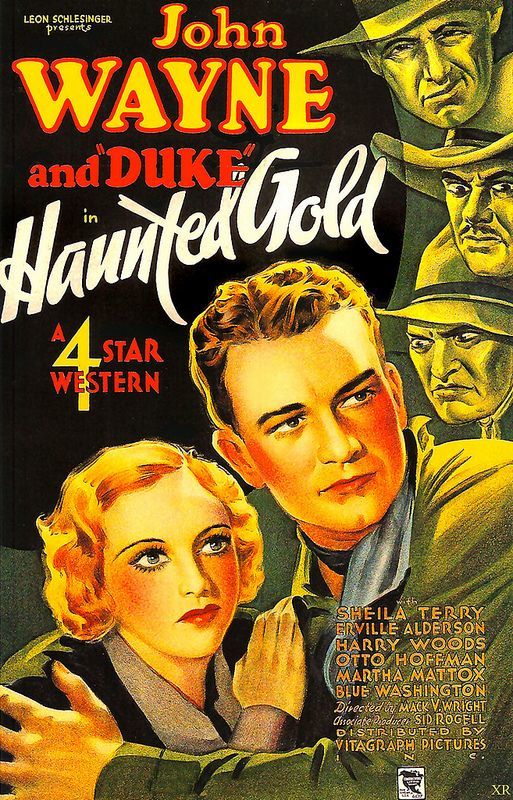In a continuing quest to find and review every cowboy western movie John Wayne ever made in the 1930s we present this little nugget from 1932.

Haunted Gold: Warner Bros, Dir: Mack V. Wright, b/w, 57m
Cast: John Wayne, Sheila Terry, Harry Woods, Erville Alderson, Otto Hoffman, Blue Washington
Welcome to another John Wayne / Leon Schlesinger cartoon – sorry, movie. The good news is Duke has been promoted further up the cast list, although that’s the horse I’m referring to, not JW.
An encouraging atmospheric start with shadows on the wall, eerie sounds and coyote cries, decrepit graveyards, hooting owls, eyes staring from a hole in the wall, soon dissipates into a hackneyed feature with haunted gold mines, a character known as ‘the Phantom’, and the usual combination of punch-ups and horse chases to keep the audiences of the day engaged.
It’s also another Ken Maynard remake, this time The Phantom City, made four years earlier, thus recycling footage from the earlier film. I see that JW and Ken are still sporting mismatched shirts, just like they did in The Big Stampede.
Where’s the continuity girl when you need her?
It’s all a bit Agatha Christie Go’s West, what with a bunch of people receiving mysterious invitations to a derelict town in which the haunted mine is located.
Wayne, as rancher John Mason, has a half-share in the mine along with his father’s partner’s daughter, Janet, played by Sheila Terry. Along comes the villain, Joe Ryan, to spoil the party, but needless to say love triumphs over evil and the couple lock lips in front of a black and white sunset.
What’s interesting is the choice of Wayne’s sidekick, with the character of Clarence Washington Brown played by the African American actor Blue Washington.
With this being two years before the introduction of the Hollywood Production Code, there are inevitable references to Clarence’s
This includes a slightly uncomfortable moment when, after Wayne is invited to enter someone’s house for a talk, he silently gestures towards his compatriot, the inference being that Clarence might not be welcome. Which it turns out he isn’t.
After a hilarious sequence – just so you know, I’m being facetious here – in which Clarence flees a cabin full of cobwebs and scuttling rodents, he runs into the house he had previously not been welcome in, only to be relegated to the hallway whilst JW converses with his soon-to-be-girlfriend in the sitting room.
I rather tired, in the end, of the constant jabbering, gulping and general wide-eyed horror of Clarence that passes for some kind of comic relief in this movie.
Yet again, different times, my friends, different times.
A couple of the baddies meet surprisingly unpleasant deaths towards the end, one screaming as he’s pushed over a cliff by Duke, the psychotic killer horse (he has form already in Ride Him Cowboy), whilst another falls to his death during a fight in a cable car with Duke (the other one).
This last sequence isn’t exactly Where Eagles Dare but the demise of the two villains is slightly out of kilter with the tone of the rest of the film.
One final comment. Not that I found this in any way arousing, but Wayne’s trousers appear to be immodestly close-cut. You might say they were so revealing you could guess JWs religion and, whatever denomination that might be, I’d wager he’s definitely no Bar Mitzvah boy.
Stay in the 1930s with a review of John Wayne in The Telegraph Trail (1933)
